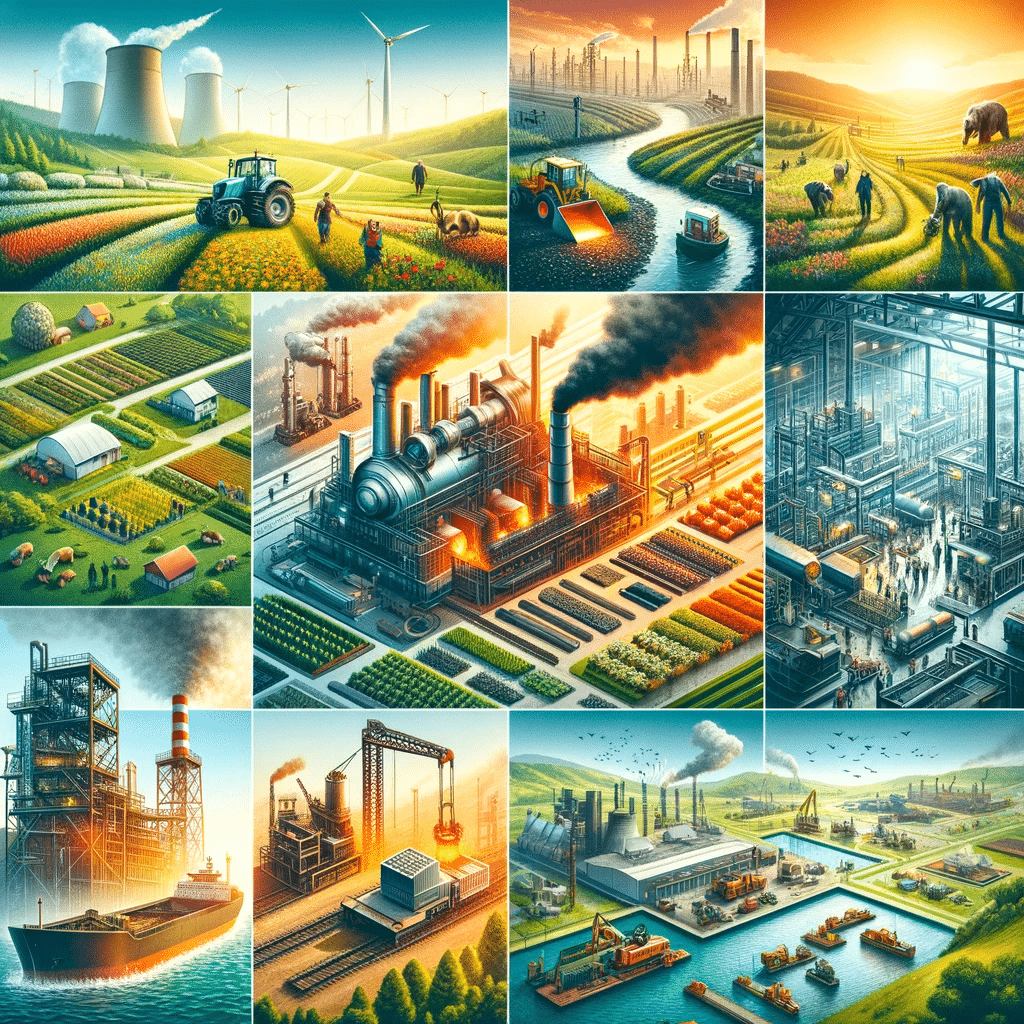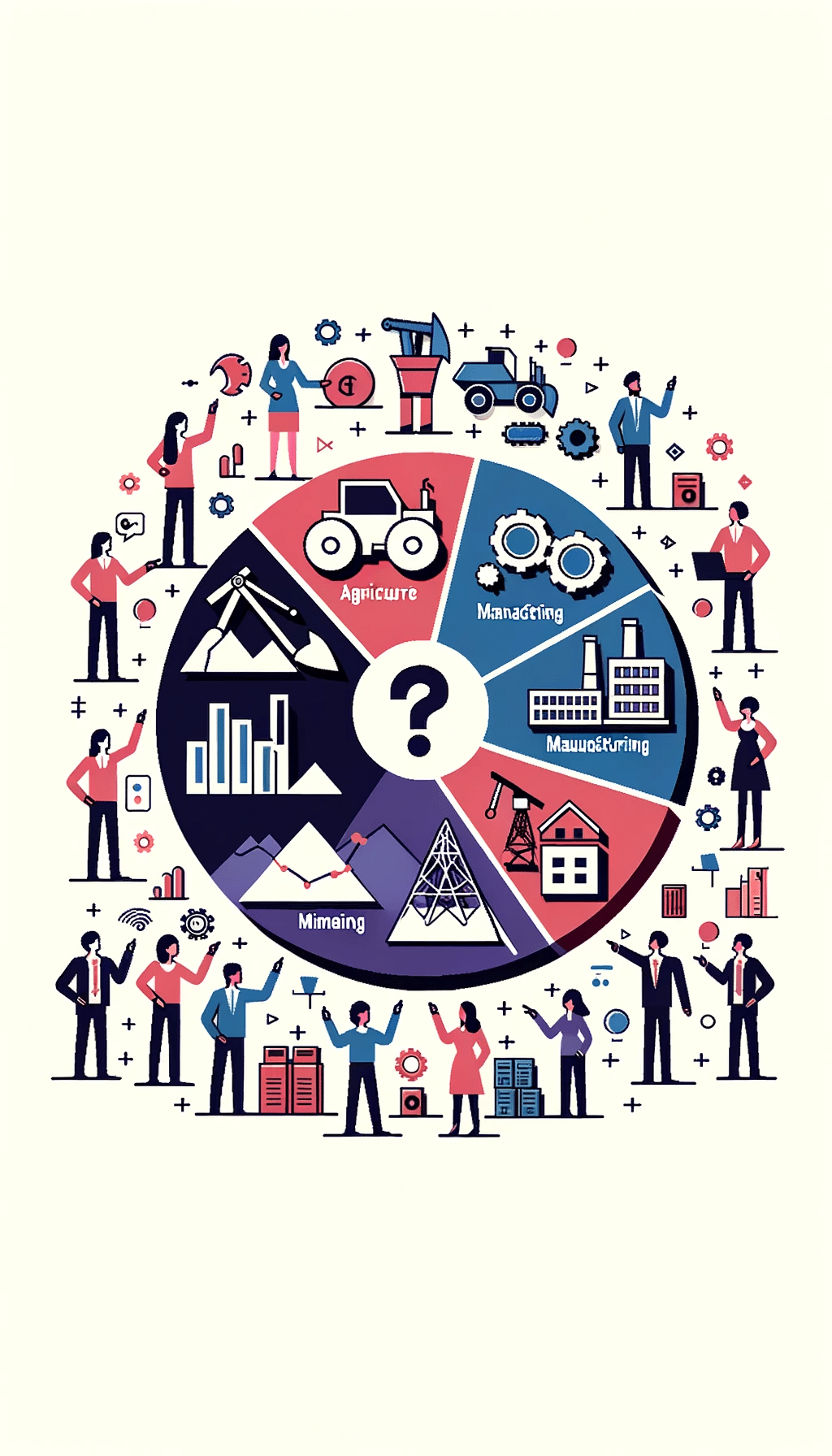
The question “Is Basic Industries a Good Career Path ?” is one that many job seekers ponder, particularly those interested in hands-on work that plays a crucial role in driving the global economy. Basic industries encompass sectors like manufacturing, agriculture, mining, and energy production, which are essential for producing raw materials and goods that fuel other industries. These sectors form the backbone of economic development, ensuring that resources such as food, energy, and infrastructure materials are consistently available to meet society’s needs.
Basic industries are not just about producing essential goods but also about fostering innovation through advancements in technology and sustainable practices. They are evolving, with emerging trends like automation and green energy reshaping job roles and career opportunities. As these industries continue to grow, they offer diverse job prospects for individuals across varying educational and skill levels.
To explore more about what is Basic Industries read our post: Understanding Basic Industries: 2024 Comprehensive Guide
In this article, we’ll provide a balanced view of the opportunities and challenges within basic industries, helping you determine whether this career path aligns with your professional goals.
By the end, you’ll have a clearer understanding of whether basic industries offer the right career path for you.
Why Choose a Career in Basic Industries?
Choosing a career in basic industries can be a rewarding decision, especially for individuals who value stability, diversity in job roles, and opportunities for growth.
Here are the key reasons why basic industries could be a great career path:
1. Job Stability
One of the most attractive aspects of working in basic industries is job stability. These industries produce essential goods, such as food, energy, and raw materials, that are always in demand. Whether in times of economic growth or downturn, basic industries remain crucial to society’s functioning. For example, industries like agriculture and energy production are fundamental to human survival and infrastructure development, ensuring a consistent demand for workers. This long-term stability is appealing for those seeking secure employment.
If you’d like to dive deeper into the outlook for basic industries, our Industry Analysis provides a comprehensive overview.
2. Diverse Career Opportunities
Basic industries offer a wide range of career paths across various sectors. Whether you’re an engineer, a production worker, or a quality control specialist, there are numerous roles to suit different skill sets and educational backgrounds. For example:
- Engineers work on designing efficient systems and machinery for production.
- Production workers are responsible for operating machines and assembling products.
- Quality control specialists ensure that the products meet industry standards and safety regulations.
Additionally, fields like mining, agriculture, and manufacturing offer career growth opportunities, often starting from entry-level positions and progressing to supervisory or managerial roles. To get an idea of what kinds of companies operate in this field, visit our guide on What Companies Are in the Basic Industries Field.
3. High Pay Potential
While some roles in basic industries may not require advanced degrees, many positions offer competitive salaries. For instance, high-paying jobs such as petroleum geologists, industrial engineers, and safety managers can offer salaries ranging from $70,000 to over $150,000 annually, depending on experience and location. Some of the best-paying jobs can be found in sectors like energy production, mining, and manufacturing. You can explore specific high-paying roles in our detailed post on the Best Paying Jobs in The Basic Industries.
4. Technological Growth
Basic industries are evolving rapidly, with advancements in automation, artificial intelligence, and sustainability creating new job roles and opportunities. Automation has revolutionized manufacturing and mining, improving efficiency while reducing manual labor. Meanwhile, sustainability trends are pushing industries to adopt greener practices, opening up careers in renewable energy, environmental engineering, and sustainable agriculture.
As technology reshapes traditional roles, there’s also a growing demand for professionals who can operate and maintain advanced machinery, manage data-driven production systems, and develop eco-friendly solutions. These innovations provide a dynamic and forward-looking career landscape for those entering the field.
According to Statista, as of July 2025, industries related to basic industries, such as manufacturing, construction, agriculture, and mining, represented a significant portion of the U.S. labor market. Specifically, manufacturing accounted for about 15.6 million job openings, while construction had around 11.9 million. The agriculture and related industries reported 2.26 million job openings, and mining, quarrying, and oil and gas extraction had approximately 590,000 openings.
Is Basic Industries Right for You?

Deciding if a career in basic industries is the right fit involves understanding the nature of the work, the skills you’ll develop, and the opportunities for long-term growth. Here’s what you should consider:
1. Hands-On Work
Many roles in basic industries involve physical labor, which makes them suitable for individuals who prefer hands-on tasks and enjoy working in dynamic environments. Whether it’s operating machinery in a manufacturing plant, working on a farm, or mining for raw materials, these jobs often require physical stamina and a willingness to work outdoors or in industrial settings. If you enjoy practical, problem-solving tasks and thrive in active, non-desk environments, a career in basic industries might be ideal for you.
However, it’s important to recognize that some roles can be physically demanding and involve exposure to challenging conditions, such as extreme weather or heavy machinery. Those who seek more sedentary, office-based jobs may want to explore other sectors.
2. Skill Development
A career in basic industries offers numerous opportunities to develop highly transferable skills. From technical knowledge like machinery operation and safety protocols to soft skills such as problem-solving and project management, workers in this sector gain competencies that are valuable across various industries.
For example:
- Problem-solving: Whether troubleshooting equipment in a factory or addressing environmental challenges in mining, problem-solving is a daily aspect of many jobs in basic industries.
- Technical expertise: Learning to operate advanced machinery, interpret blueprints, or manage production lines builds critical technical skills.
- Project management: As you advance in your career, project management skills become essential, particularly in overseeing teams, managing resources, or ensuring that large-scale production processes run smoothly.
The hands-on nature of many roles also allows for real-time learning and on-the-job training, making it a good fit for those who prefer learning by doing.
3. Career Growth
The potential for career advancement in basic industries is significant, particularly for those who are willing to gain experience, develop specialized skills, and take on leadership responsibilities. Many industries, such as manufacturing, mining, and agriculture, offer clear progression paths. Starting in entry-level positions such as production workers or technicians, it is possible to advance to roles like supervisors, managers, or even operations directors.
For individuals interested in higher-level roles, there are options to move into fields such as environmental management, safety supervision, or process engineering, where both responsibilities and salaries increase substantially. The diversity of roles within basic industries allows for growth both vertically and laterally, depending on your interests and strengths.
To understand the range of available jobs and growth opportunities, you can check out our post on How Many Jobs Are Available in Basic Industries, where we explore the current job market and the future outlook for the industry.
Who Should Consider a Career in Basic Industries?
A career in basic industries is well-suited for individuals who have a strong work ethic, enjoy working with their hands, and have an interest in technical roles. This field often demands practical skills, attention to detail, and the ability to adapt to challenging environments. Those who are comfortable with physically demanding work and appreciate the satisfaction of producing tangible goods, such as raw materials or energy, will likely excel in basic industries.
People who thrive in technical environments, where machinery and tools are essential parts of the job, would also find this career path appealing. These roles require problem-solving abilities, as many tasks involve troubleshooting and maintaining complex systems. Additionally, basic industries often provide the opportunity to work in dynamic, fast-paced settings, whether it’s on a construction site, in a factory, or in the energy sector.
While some sectors within basic industries, like mining or agriculture, can be physically demanding and may involve working in harsh conditions, the long-term rewards can be significant. Many positions offer clear career progression, moving from entry-level roles to management positions over time, without requiring advanced degrees. This path can be especially rewarding for those who are motivated to learn on the job, as the experience gained in basic industries is often highly transferable to other sectors.
For individuals with resilience, adaptability, and an interest in seeing the direct impact of their work, basic industries can provide a fulfilling and stable career. While some sectors may present challenges, such as market volatility or environmental impact concerns, they also offer the opportunity to work at the heart of industries that are essential to the global economy.
To learn more about the industries that form the backbone of the global economy, visit our post on Basic Industries Examples: 4 Pillars of Global Prosperity.
Future of Basic Industries

The future of basic industries is being shaped by major global trends, particularly the drive towards sustainability and the increasing adoption of green energy solutions. As the world faces growing environmental challenges, basic industries are evolving to meet new demands, balancing economic growth with environmental responsibility.
One of the most significant changes in basic industries is the shift towards sustainable practices. Many sectors within basic industries, such as mining, agriculture, and manufacturing, are integrating environmentally friendly technologies and processes to reduce their carbon footprints. The adoption of renewable energy sources like wind, solar, and hydropower is becoming more prevalent, especially in energy production and heavy industries. This transition is creating new opportunities for those interested in roles related to clean energy, environmental management, and sustainable manufacturing practices.
In sectors like mining and agriculture, the integration of renewable energy is helping reduce reliance on fossil fuels, decreasing emissions, and promoting long-term environmental sustainability. For example, mining operations are increasingly using solar energy to power their machinery, while agricultural firms are adopting green technologies to enhance crop yields with minimal environmental impact. This trend not only promotes sustainability but also drives innovation, creating new job roles focused on the development and implementation of these technologies.
At the same time, automation and digitization are playing a key role in the future of basic industries. Technologies such as artificial intelligence (AI), robotics, and advanced data analytics are transforming traditional operations, making production more efficient and reducing human error. In manufacturing, smart factories are emerging, where interconnected machines and automated systems streamline production processes. This shift is changing the skillsets required in basic industries, with a growing demand for workers who are proficient in handling advanced technology, data systems, and AI-driven processes.
As these sectors evolve, the combination of green energy initiatives and technological advancements is creating a more sustainable and efficient landscape. For those interested in the future of basic industries, the opportunities are expanding, particularly in areas focused on innovation and environmental responsibility.
Is Basic Industries a Good Career Path? (Our Expert Opinion)
Yes, a career in basic industries is an excellent choice, especially for individuals who enjoy hands-on work and solving complex problems. Basic industries, which include fields like mining, agriculture, and energy production, play a pivotal role in the global economy by providing essential raw materials.
These industries offer abundant opportunities for both entry-level workers (no degree required) and experienced professionals, with career paths leading to highly lucrative positions. Furthermore, many roles provide steady career growth, job security, and the satisfaction of contributing to fundamental sectors of the economy.
FAQs
What is the Best Career Path to Make Money?
The best career path for making money depends on individual skills, education, and interests. In basic industries, some of the highest-paying roles include petroleum engineers, industrial production managers, and environmental engineers. These positions often require specialized skills and experience but can offer salaries well above the national average. Outside of basic industries, other high-paying fields include technology (e.g., software engineering), healthcare (e.g., surgeons, anesthesiologists), and finance (e.g., investment banking, private equity). Each of these sectors offers significant earning potential, especially with experience and advanced qualifications.
What Are the Best Paying Jobs in Basic Industries?
Some of the highest-paying jobs in the industries include roles like petroleum geologists, mining engineers, and plant managers. These positions often require specialized technical knowledge and experience, but they can offer salaries ranging from $80,000 to over $150,000 annually according to U.S. Census Bureau, depending on the level of expertise and location.
What Are the Challenges of Working in Basic Industries?
While basic industries offer numerous advantages, they also come with challenges. Many jobs in these sectors involve physically demanding work and exposure to potentially hazardous environments, especially in fields like mining or construction. Additionally, some industries are vulnerable to market fluctuations, which can affect job security. Environmental concerns are also an issue, as sectors like manufacturing and mining have a significant impact on the planet, prompting stricter regulations and sustainability efforts.
Is Basic Industries a Good Career Path in 2026?
Yes, basic industries are a solid career path in 2026, especially for individuals seeking job stability, diverse opportunities, and potential for growth. These industries, which include sectors like agriculture, mining, manufacturing, and energy production, provide essential goods and services that are always in demand. With advancements in technology and sustainability, basic industries are evolving, offering new career paths in areas such as automation and green energy. While some roles can be physically demanding, the long-term prospects and job security make it an appealing choice for many.
A quick overview of the topics covered in this article.
Latest Posts
Subscribe to our newsletter
Get valuable insights and business guidance sent to your email.










